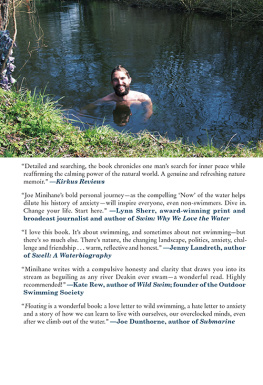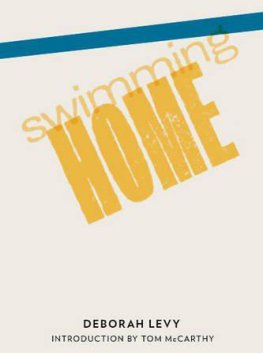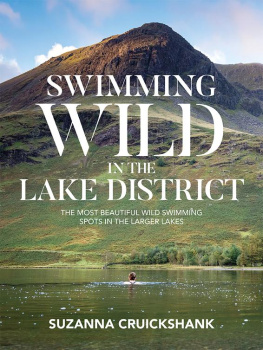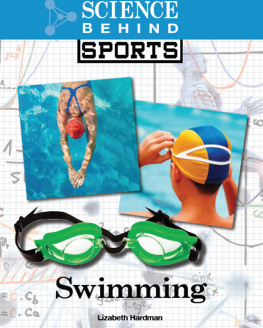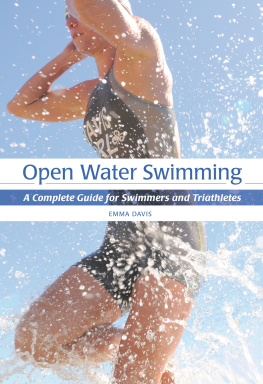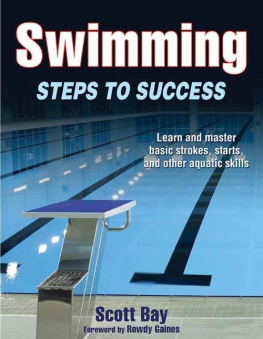First published in hardcover in the United States and the United Kingdom by Overlook Duckworth in 2017
LONDON
30 Calvin Street, London E1 6 NW
T: 020 7490 7300
E:
www.ducknet.co.uk
For bulk and special sales please contact
NEW YORK
141 Wooster Street
New York, NY 10012
www.overlookpress.com
For bulk and special sales please contact
Copyright 2017 Joe Minihane
Lyrics from Mutual Benefits Strong Swimmer Mutual Benefit/Mom and Pop Music, reprinted with permission
Quotation from Steaming by Nell Dunn used with the permission of Amber Lane Press, copyright Nell Dunn, 1981
Quotes from Waterlog by Roger Deakin, published by Chatto & Windus, reprinted by permission of The Random House Group Ltd.
Lines quoted from Where the Water Comes Together, from All of Us: The Collected Poems by Raymond Carver, published by Harvill Press, reprinted by permission of The Random House Group Ltd.
All rights reserved. No part of this publication may be reproduced, stored in a retrieval system, or transmitted, in any form or by any means electronic, mechanical, photocopying, recording or otherwise, without the prior permission of the publisher.
ISBN: 978-1-4683-1534-9

J ournalist Joe Minihane became obsessed with wild swimming and its restorative qualities, and developed his new-found passion by following the example of naturalist Roger Deakin in his classic Waterlog. While putting one arm over the other, sometimes resting on his back, Minihane begins to confront the often buried issues in his life. Along the way, he rekindles old friendships and forges new ones, and after an unexpected setback discovers that he has already gained enough strength to be able to continue his recovery on dry land. The activity that he describes is both strange and beautiful, as the wild water puts him in touch with nature and himself.
Floating is a remarkable memoir about, on the surface, a passion for swimming and nature. Moving from darkness into light, it is as intense and moving as it is lyrical and generous. It captures in memorable detail Minihanes struggle to understand his life and move forward and, steeped in the anti-authoritarian and naturalistic spirit of Roger Deakin, celebrates the joy of taking time out to feel better.
From Hampstead to Yorkshire, from Dorset to Jura, from the Isles of Scilly to Waleswith this book, Joe Minihane has written what is often a love letter to different wild stretches of water. We swim with him through ponds and lakes, rivers and canals, lodes and marshes, even the ice-cold sea. With him, we too finally come out of the water and dry ourselves off.
For Keeley

T he blinds were not doing their job. A shaft of sunlight breached the wooden slats as I stirred and fumbled around on the bedside table for my watch: 4.12 a.m. I lifted myself onto my left elbow, took a swig of stale water from the glass Id left out the previous evening, and sighed.
Keeley, my wife, was sound asleep next to me. Her breath caught in her throat with a rhythmic click, her arms raised above her head the way she always slept. Her dark brown hair spread out across the pillow.
I moved carefully so as not to wake her, pushed my pillows back onto the headrest and sat upright. Through the break in the blinds I could see a bright blue sky emerging. It was midsummer, almost a year since I had quit my job as a journalist to go freelance, and my mind was full to bursting with worry.
Thoughts zipped across my brain like plane contrails. Every time I tried to follow one I would lose it as another hove into view. I would chase that one and then the next one. My mind could not settle. I had been awake all of five minutes and already I could not stop this swell of anxiety from lifting me up and taking me out into the depths with it.
Work was what made me most anxious. What was I really doing? In the past month I had written news articles about the chipset of an unreleased smartphone and covered the launch of a new Bluetooth speaker. To my mind, everything I had set out to do when I had decided to become a journalist at the age of nineteen was gone. I had failed to amount to anything as a music writer, made a fool of myself while trying to learn to drive when working for a major motoring magazine and wound up presenting corporate videos from big brands to pay the bills.
Where was the glamour, the excitement, the buzz I had always wanted from working in London? What had happened to my dreams? I was struggling to equate the need to make money with what I was doing in order to get it. I felt as if I needed to grow up and be more mature, but just thinking about it brought me down.
To compound it all, the regular writing I had been doing on the latest technology trends for a friends website had ended. Budgets had been slashed. I looked down at Keeley. She always believed in me and told me how well I was doing. But despite the fact that I loved her, I couldnt agree. I had never wanted to write about technology. But it had always paid OK, and now I worked for myself I had to find cash somehow. I had learnt on short work placements, and then over a series of full-time roles, that I hated the confines of the office. The rules. The politics. The clock-watching. But with this regular source of income gone, would I have to go back? How would I cover the rent otherwise? Would I have enough money to still go out, to go on holiday? How could we ever save to buy a house or have enough money to bring up kids in the future? Were these things I could even give her?
Keeley worked full time as a journalist. We would be OK. But I felt a strong sense of responsibility towards her to make everything right. To be in control. To show her I could provide. To make life predictable. That way, I believed, worry would stop and life would begin.
She had never asked this of me. But I worried all of the time about it. I wanted to make sure that everything was easy for her, for us. She was loving, warm, caring, supportive, and had always been there since we had got together at the end of our time together at journalism college.
I knew I was being overly harsh on myself, that my thoughts were needlessly cruel, but still I chased them, one after another, after another. Why was I not as successful as the people I used to work with? Success to me was working for big publications, going on glamorous assignments, interviewing my favourite bands; not having to churn out copy about phones, games consoles and speakers, or doing advertorials to make ends meet. I believed, misguidedly it turned out, that successful people didnt need to indulge in the everyday, the things that help pay the bills.
Why had I not done what I always said I would do and become a travel writer, follow in the footsteps of my literary heroes like Paul Theroux, seeing new places, meeting new people, learning new things and writing about them for a voracious readership? Could I ever do this? Surely not. I felt I had become trapped in a professional rut failed to live up to the lofty expectations that I had set for myself.
I could never tell anyone this. It felt easier to lie in the dawn light and allow my mind to crank through the gears. I wasnt sure if Keeley would understand, but I didnt know why I felt like that. She was the best thing that had ever happened to me. A vivacious, life-affirming presence whose calm assurance and beautiful, glittering blue eyes made my stomach flip whenever I thought about her.
I felt guilty for not telling her how anxious I was and how, when she went to work every day, I felt an enormous sense of guilt for having all of this time on my hands to chase editors, to come up with killer story ideas, to be the person I always thought I could be, when instead all I would do was sit on the sofa and feel low. I felt ashamed of the whole sorry mess.

